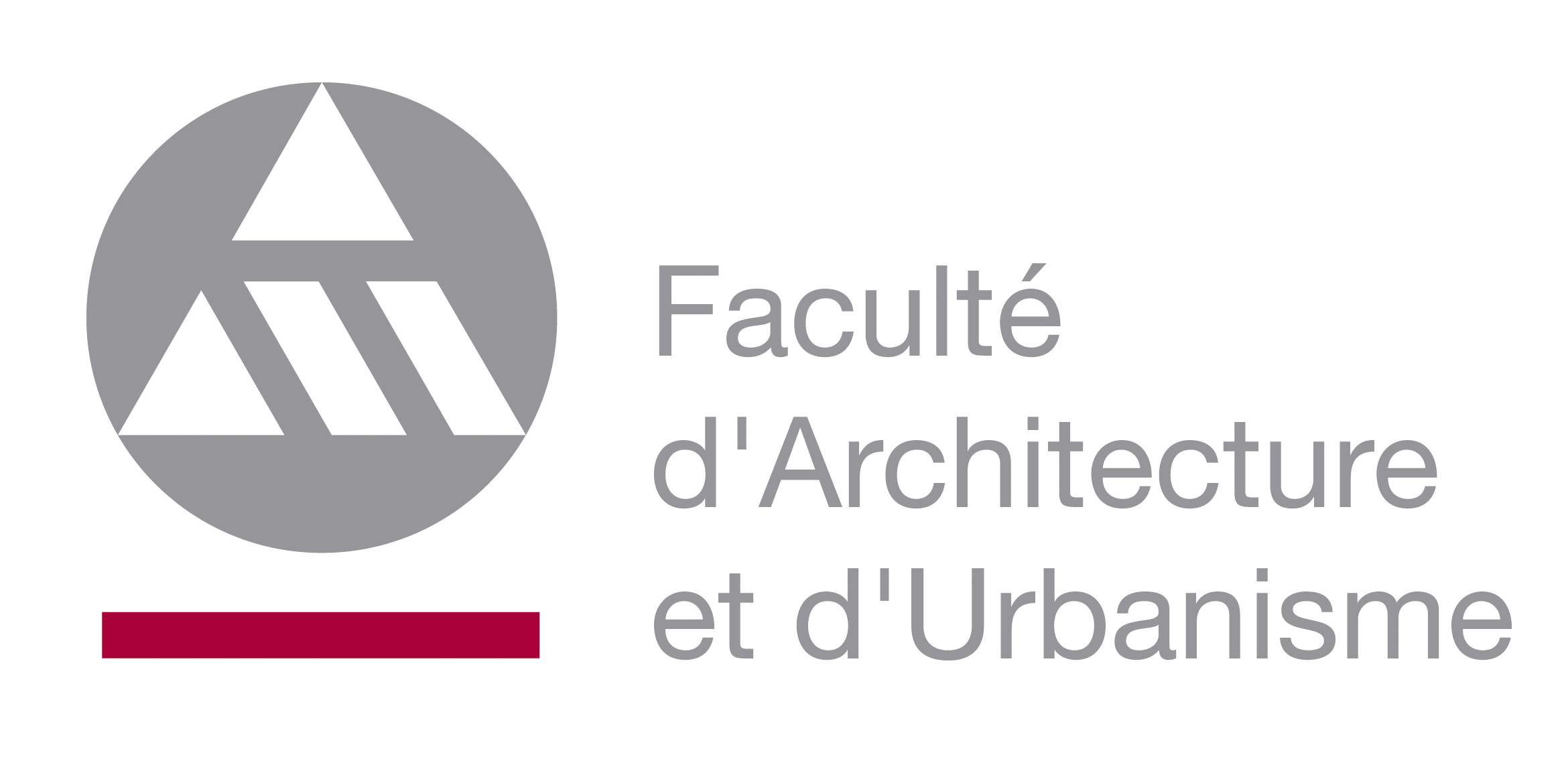 | Study programme 2019-2020 | Français | |
 | Theories of Architecture I | ||
Programme component of Bachelor's in Architecture à la Faculty of Architecture and Urban Planning |
| Students are asked to consult the ECTS course descriptions for each learning activity (AA) to know what assessment methods are planned for the end of Q3 |
|---|
| Code | Type | Head of UE | Department’s contact details | Teacher(s) |
|---|---|---|---|---|
| UA-B1-ARCHIT-002-M | Compulsory UE | POULEUR Jean-Alexandre | A530 - Service d'Architecture et Société |
|
| Language of instruction | Language of assessment | HT(*) | HTPE(*) | HTPS(*) | HR(*) | HD(*) | Credits | Weighting | Term |
|---|---|---|---|---|---|---|---|---|---|
| Français | 22 | 2 | 0 | 0 | 0 | 2 | 2.00 | 2nd term |
| AA Code | Teaching Activity (AA) | HT(*) | HTPE(*) | HTPS(*) | HR(*) | HD(*) | Term | Weighting |
|---|---|---|---|---|---|---|---|---|
| A-CARC-101 | Theories of Architecture I | 22 | 2 | 0 | 0 | 0 | Q2 | 100.00% |
| Programme component |
|---|
Objectives of Programme's Learning Outcomes
- Instruct an architectural issue
- Study the different components of a theme to articulate its findings in a comprehensive summary
- Build an architectural culture based on theoretical and critical knowledge and personal reading
- Contextualise their approach to architecture
- Plan and organise architecture projects adapted to a context
- Develop a spatial response
- Develop a project methodology integrating the various constraints related to the architectural discipline
- Design a project, taking into account the different scales of analysis
- Implement an identified spatial response
- Adopt an applied scientific approach
- Interact with all actors
- Provide, share and defend their ideas in collective discussion related to governance frameworks.
- Make choices
- Demonstrate reflexivity, openness and initiative
- Demonstrate ethical values
Learning Outcomes of UE
Understand the links between the "Theory of architecture", societies and democracies. Awaken to the complexity of factors that lead to architectural creativity in society. Have a first cultural base required to understand these concepts. Enter into the space governance mechanisms. Be able to identify theoretical trends which have led to the production of architecture both in Hainaut province and internationally. Use tools of observation, analysis and understanding of architecture to see it in its spatiality and temporality. In short, out of a rough and blurred vision, students should possess specific architectural analytical skills and begin to develop their abilities to summarise this information.
Content of UE
See Learning Activity
Prior Experience
Mastery of the French langage (CESS level)
Type of Assessment for UE in Q2
- Written examination
Q2 UE Assessment Comments
The evaluation consists of a standard examination on the matters treated during the course: a written test consisting of a MCQ (multiple-choice questionnaire), concepts to be explained and/or topics to be developed. It aims to determine the accuracy of your architectural analysis capacities. The written personal notes could be considered as part of your evaluation (a copy must be conserved by the student). Your participation on the Moodle forum could be considered a bonus for your evaluation.
Type of Assessment for UE in Q3
- Written examination
Q3 UE Assessment Comments
Idem Q2 except for the written personal notes.
Type of Teaching Activity/Activities
| AA | Type of Teaching Activity/Activities |
|---|---|
| A-CARC-101 |
|
Mode of delivery
| AA | Mode of delivery |
|---|---|
| A-CARC-101 |
|
Required Reading
| AA | |
|---|---|
| A-CARC-101 |
Required Learning Resources/Tools
| AA | Required Learning Resources/Tools |
|---|---|
| A-CARC-101 | Jean-Alexandre Pouleur, A.-C. Bioul et A. Dauchot, Charleroi, ville d'architectures, Espace Environnement, 2007, 112 pp. |
Recommended Reading
| AA | Recommended Reading |
|---|---|
| A-CARC-101 | Copie de présentation - Partie 1 - Théorie de l'architecture : architectures et démocratie Partie A - Jean-Alexandre POULEUR ,Copie de présentation - Partie 2 - Théorie de l'architecture : architectures et démocratie Partie B - Jean-ALexandre POULEUR ,Copie de présentation - Partie 3 - Théorie de l'architecture : architectures et démocratie Partie c : Le PARTI - Jean-Alexandre Pouleur |
Recommended Learning Resources/Tools
| AA | Recommended Learning Resources/Tools |
|---|---|
| A-CARC-101 | Bruno Zevi, Apprendre à voir l'architecture, éditions de Minuit, Paris 1959 (2005), 135pp en partie Jacques Aron, Architecture et société, CIAUD/ICASD, 1976, Bruxelles, 127 pp. Bibliographie et documentation renseignée. |
Other Recommended Reading
| AA | Other Recommended Reading |
|---|---|
| A-CARC-101 | Not applicable |
Grade Deferrals of AAs from one year to the next
| AA | Grade Deferrals of AAs from one year to the next |
|---|---|
| A-CARC-101 | Authorized |